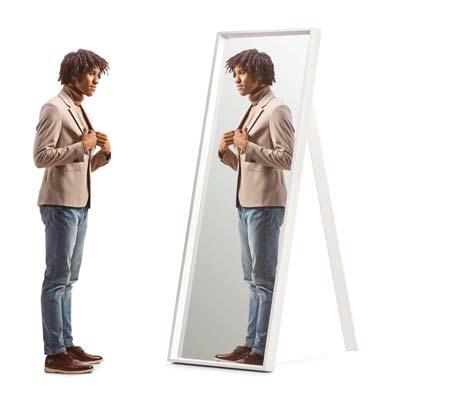कोशिश गोल्ड - मुक्त
MIRROR PHYSICS
How It Works UK
|Issue 200
Reflect on the science of light bouncing off smooth and shiny surfaces

The first mirrors date to around 6,000 BCE, but people have used reflections in natural features such as puddles for many thousands of years. When you look into a mirror, the reflection looking back at you is a life-size, exact visual copy. The angle at which you face the mirror determines what reflection you see - just as if you were to throw a ball at a wall, the angle at which it returns is equal to the angle it hits the wall at. Because the sides of an object line up exactly with the sides of the reflected image, the mirror image is a horizontally flipped version of reality. Your brain interprets the mirror image of you as another person who has turned to face towards you. When you lift your left arm, for example, it appears as if the mirror image of you is raising their right.
Light only behaves in this way when it interacts with a smooth, reflective surface.
यह कहानी How It Works UK के Issue 200 संस्करण से ली गई है।
हजारों चुनिंदा प्रीमियम कहानियों और 10,000 से अधिक पत्रिकाओं और समाचार पत्रों तक पहुंचने के लिए मैगज़्टर गोल्ड की सदस्यता लें।
क्या आप पहले से ही ग्राहक हैं? साइन इन करें
How It Works UK से और कहानियाँ

How It Works UK
FORMULA FAST
YOUR ULTIMATE GUIDE TO FORMULA ONE RACING
1 mins
Issue 212

How It Works UK
MY LIFE AS AN ASTHMANAUT
A CHILDREN'S BOOK ABOUT ASTHMA
1 min
Issue 212

How It Works UK
LYDIA LOVES BUGS
A SHORT AND SWEET STORY OF AN ENTHUSIASTIC ENTOMOLOGIST
1 min
Issue 212

How It Works UK
INSIDE A DRONE
Drones aren't just for the military any more. These flying marvels are now taking over our lives
3 mins
Issue 212

How It Works UK
WE CAN HEAR WITHOUT EARS
AND OTHER THINGS YOU DIDN'T KNOW WE PLANTS COULD DO
1 min
Issue 212

How It Works UK
DO GEESE GET GOOSEBUMPS?
Many animals experience a similar reaction when they feel cold or scared
2 mins
Issue 212

How It Works UK
SUBMARINES WITHOUT SAILORS
Dive into the world of autonomous submarines and discover the mission that will see one sail around the world
4 mins
Issue 212

How It Works UK
WHAT HAPPENS INSIDE A COCOON?
How certain species of insects transform from crawling caterpillars to flying moths and butterflies
3 mins
Issue 212

How It Works UK
HOW THE ROSE LOST ITS SCENT
From floral to fragranceless, there's a biological reason behind a rose's missing odour today
3 mins
Issue 212

How It Works UK
How many insects have been discovered so far?
The total number of named species is around a million.
7 mins
Issue 212
Listen
Translate
Change font size
